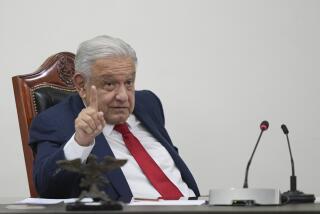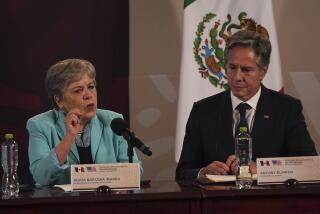Church Will Stay Out of Politics, Pope Promises : Religion: John Paul spends a whirlwind day on the road in Mexico. He praises warming relations with the traditionally anti-clerical nation.
- Share via
MEXICO CITY — Pope John Paul II hailed a new era of improved relations between the Vatican and a long-hostile Mexican government Tuesday, promising that the church would not interfere in politics.
The freewheeling third day of the Pope’s Mexican sojourn took him from Aguascalientes, north of Mexico City, to a Mass at a shrine in San Juan de los Lagos and back to the capital for a nighttime speech to the diplomatic corps.
He encouraged teachers, preached morality to Mexico’s young people and told the diplomats that ethics are as important as bookkeeping in confronting Third World debt.
The context for the busy day was the steadily warming relations between the church and the government of the only Roman Catholic nation whose constitution is virulently anti-clerical, a legacy of historic interventionism by a rich church on behalf of the conservative and the often repressive status quo.
Healing old wounds with the receptive government of President Carlos Salinas de Gortari is a major goal of the eight-day papal visit on behalf of a church that seeks a constitutional amendment revoking longstanding restrictions on religious practices that, among other things, forbid Catholic education.
Addressing teachers in Aguascalientes, a 55-minute flight north of the capital, John Paul celebrated the improvement of church-state relations in a country that prizes its revolutionary past.
“A new perspective of contacts between the church and the political community in this country is taking place now,” he said.
“In this new phase of better understanding and dialogue, the church wants to make its own contribution, without exceeding the bounds of its own goals and specific competencies.”
The Pope made an implicit appeal for the aboveboard return of church-run schools, saying that the educational needs of a developing Mexico “favor all initiatives to improve the level of instruction.” At present, parochial schools are tolerated, but are technically illegal.
“The hope is that the sun will finally set on the prejudice that holds that the church is a brake in the fields of culture and science,” John Paul said.
In a conciliatory gesture, Salinas went to the airport to greet John Paul on Sunday.
On Monday, they met privately for more than an hour at the Presidential Palace. Describing the meeting as cordial--tea for Salinas, coffee for the Pope--the Mexican government said the two leaders amicably discussed the decline of ideologies in a changing world but did not touch directly on church-state issues.
Also Tuesday, the Vatican expanded the role of its representative to the church in Mexico, making him also a “permanent special envoy” to the government.
This completes an agreement between John Paul and Salinas in February to exchange personal representatives and ends more than a century without official contacts between Mexico and the Holy See.
In his homily during the Mass in San Juan de los Lagos, John Paul urged Mexico’s young people to resist “the powers of evil . . . that want to convert you into puppets and instruments easily manipulated in the service of a culture without solidity or horizon.”
He urged them to resist temptations of “destructive and killer drugs, the blind force of hedonism and the irrational arrogance of violence.”
Speaking to the diplomatic corps, John Paul returned to one of his favorite themes, scoring the weight of foreign debt on Third World development efforts. He urged rich nations to “diligently consider the ethical dimension” in seeking debt remedies.
This morning, John Paul flies to Durango for an overnight stay. On Thursday, he will visit Chihuahua and Monterrey, his two most northern stops. He will return to Mexico City that night.
More to Read
Sign up for Essential California
The most important California stories and recommendations in your inbox every morning.
You may occasionally receive promotional content from the Los Angeles Times.













